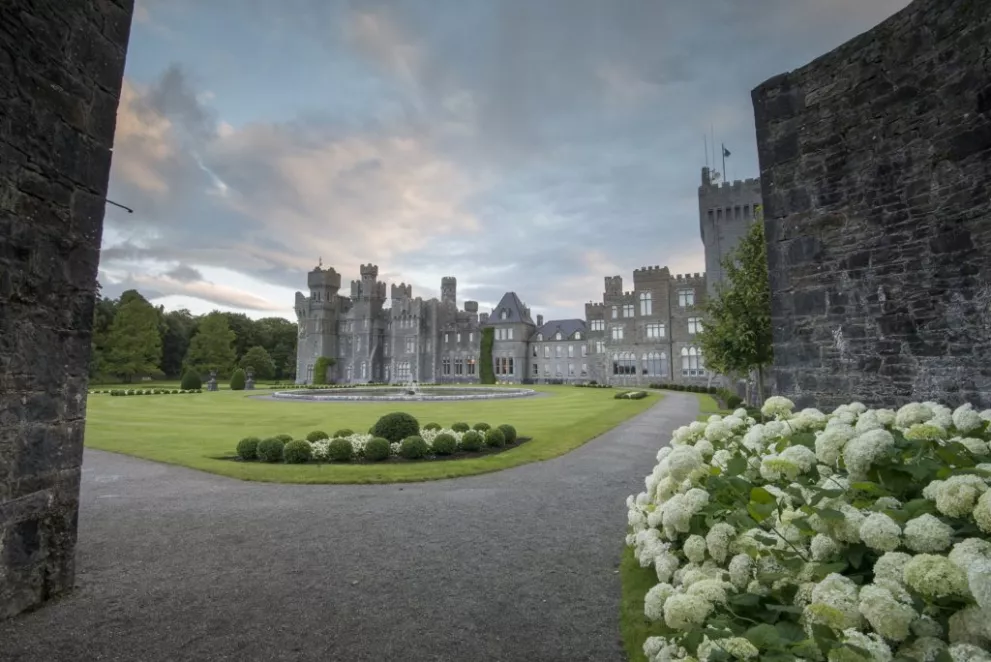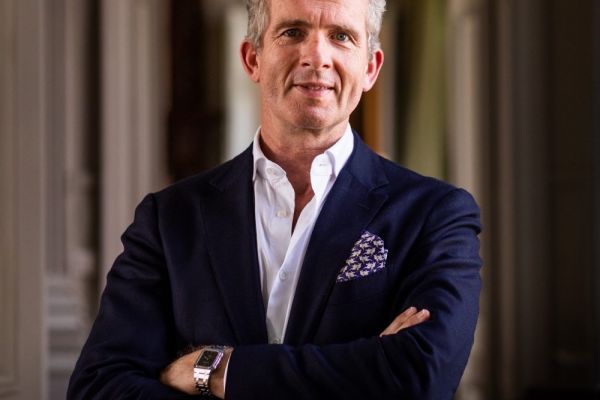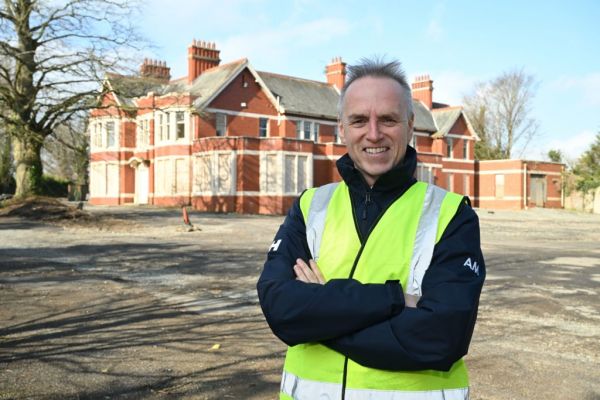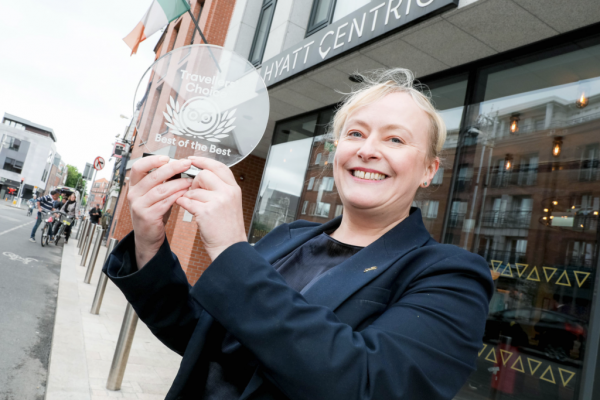Liam Finnegan, new executive head chef at Ashford Castle, tells Hospitality Ireland about moving home from the UK, the long-hours culture in cooking, and what makes a great restaurant.
This article was originally published in the Winter 2022 issue of Hospitality Ireland Magazine, in December of 2022.
Liam Finnegan has been appointed as the new executive head chef at the five-star Ashford Castle hotel, in Cong, Co. Mayo. Liam has worked in a number of prestigious restaurants in Ireland and the UK during his career, including Michael Caines’ two-Michelin-starred restaurant, Gidleigh Park, in Devon, and the Castle hotel, in Taunton (three AA rosettes). Until earlier this year, he was group executive head chef for all outlets in the Michael Caines Collection, which included three restaurants, a hotel, a central production unit, and a patisserie.
A self-professed advocate of old-school-style cooking, Liam’s philosophy is to keep things simple, and for every dish to be well sourced, uncomplicated, and perfectly executed.
Speaking about his new position at Ashford Castle, Liam – who hails from Carlingford, Co. Louth – said, “From early on in my professional career, I have admired Ashford Castle from afar – even more so since the Tollman family took stewardship of the estate. Coming home from the UK with my wife and four young children has given me a renewed sense of purpose and inspiration. I have found myself falling in love all over again with the incredible produce, suppliers and creativity of this land.”
Liam takes over from Philippe Farineau, who bids adieu to Ashford Castle after seven years of managing the hotel’s kitchen team.
Liam, tell us about your background – where you grew up, studied, etc.
I grew up in Carlingford, Co. Louth, and it is somewhere that is very special to me. This is where I first learned to cook and bake, where I had my first experience in a kitchen, and also where I learned to grow my own vegetables. My upbringing has had a huge influence on my approach as a chef – I love to bring a homely twist to my cooking. My early years brought me on to DKIT [Dundalk Institute of Technology], which is a fantastic college, and I’m still in close contact with lecturers and graduates from the culinary programme.
What first drew you to food and cooking?
My first experience with baking and cooking was thanks to my grandmother – we often used to bake soda bread together. When it came to baking, she had an instinctive knowledge – she never used scales, she just used her hands. She knew exactly how much of each ingredient to use, and it always came out perfect. My grandfather was a fishman, and I used to help my grandmother cook his fresh catches when he returned home. These moments really shaped my childhood, and it’s what drew me to the chef profession later in life.
When did you first realise that you wanted to do this professionally?
My first job found me working as a kitchen porter in a restaurant where my brother was a chef. Carlingford has some fantastic producers and creative minds that are still operating today. Working in and around this was very inspiring. My studies in DKIT and my first college placement – in Kenmare, Co. Kerry – cemented my love for cooking and the hospitality industry.
What was your first big role?
I’ve been very lucky to work in a few great roles, all of which have shaped and formed who I am today. My first head chef position was at the young age of 26, on the Isle of Wight, at the George hotel.
What was that like?
The industry was in a stage of transition, and I felt I needed to work long hours with no days off in order to prove myself. From experience, I’ve realised that, for a team to be led with consistency and longitude, there needs to be balance. I am very lucky to have found this ethos engrained within the committed team at Ashford.
Tell us about the move to Ashford Castle and what you hope to accomplish there.
The area, community and people captured my heart from the first visit. Personally, I have been re-energised by my new role as executive head chef at Ashford Castle. As a team, we want to continue to build on the food philosophy and identity that is authentic to this beautiful place and celebrate the fantastic produce of the area. Ultimately, we want to put delicious food on plates!

Ashford Castle, a 13th century castle turned into a 5 star luxury hotel.
What is the food ethos of Ashford Castle?
At Ashford Castle, there is a strong focus on sourcing fresh products from local producers, as well as growing organic seasonal ingredients in our own gardens and polytunnels. When I joined Ashford Castle, it was this element that was particularly exciting, and I am looking forward to working with the kitchen team, the garden team, and local growers and suppliers to build on this food philosophy, going forward. This way of cooking has been close to my heart from a young age, as I recall the wonderful dishes my grandparents made with vegetables from their own garden and fresh fish caught in local waters.
What makes a great restaurant?
Care, passion, and love.
How are Irish people changing as customers?
More curiosity – more open to variation and flavour profiles. More eco- and environmentally aware, which has put focus on provenance. since arriving home to the West of Ireland after many years in the UK, I have learnt so much about foraging from the land and sea by some really passionate people. At Ashford estate, foraging is an integral part of what we do – not just foraging from the estate’s grounds and woodlands, but from the surrounding areas, too. Recently, we held a foraging masterclass for staff on the estate, led by [sea forager] Brian Gannon and chef Jonathan Keane, of the lodge at Ashford. It was really fascinating to taste and learn about the wild edible gems right here on our doorstep.

Ashford Castle George V Dining Room
What are the changing trends in hospitality – people’s expectations, new elements, etc.?
I think simplicity and clarity of flavour – more diversity in spices and the way food is presented in flavour profiles, cooking over coals and wood, and experimenting in techniques. healthy eating is a big one and at the forefront – ethically reared and organic produce.
What are the major challenges at the moment?
Staffing – we need to create a balance as a collective and look at development and nurturing of all people in the industry. It’s about changing the value system.
What are the main opportunities?
Collaboration in all areas.
Do you think that the pandemic has changed what we look for in hospitality?
Yes. With a lot of time spent indoors during the pandemic and subsequent lockdowns, people have taken more interest in cooking and what we are consuming. This has led to an increase in knowledge and understanding, from a consumer standpoint. This has altered expectations of the industry.
Any other plans on the horizon for the next year or so?
Lots of plans, but I want to focus on the here and now, in Ashford Castle.
Signature dishes?
We try to create dishes with the whole team contributing ideas. What is signature is the integrity that we uphold in all of our food.
Read More: Hospitality Ireland Winter 2022: Read The Latest Issue Online!








